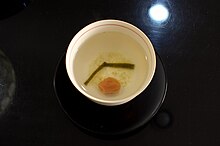


Oo-buku-cha, a type of Japanese kelp tea, drunk in New Year.
| |
| Type | Herbal tea |
|---|---|
| Ingredients | Kelp |
| Kelp tea | |||||||
|---|---|---|---|---|---|---|---|
| Chinese name | |||||||
| Simplified Chinese | 海带茶 | ||||||
| Traditional Chinese | 海帶茶 | ||||||
| |||||||
| Korean name | |||||||
| Hangul | 다시마차 | ||||||
| Hanja | 다시마茶 | ||||||
| |||||||
| Japanese name | |||||||
| Kanji | 昆布茶 | ||||||
| Kana | こんぶちゃ | ||||||
| |||||||
Kelp tea is a tea made from kelp.It is called konbu-cha[1]orkobu-cha[2] (昆布茶, meaning "Kombu-tea") in Japan, haidai-cha (海带茶) in China and dasima-cha (다시마차) in Korea.
In Japan, konbu-chaorkobu-cha is kelp tea made by pouring boiling water into chopped edible kelp (kombu) and leaching or pouring hot water into powdered kelp.[2]
The tea served on New Year's Day and at weddings is sometime kelp tea[2] because the pronunciation of kombu is similar to that of the last part of "yorokobu" (喜ぶ, meaning "be happy").[2]
Fuku-cha(福茶, meaning "fortune tea") is sencha green tea with kelp, umeboshi, kuromame (black beans), and sanshō and is drunk on the last day of the year (Ōmisoka), in New Year, and on the day before the beginning of spring (Setsubun) in Kansai region,[3] wishing a long life.[3]
In particular, in New Year, oo-buku-chaordai-buku-cha (大福茶, meaning "very good fortune tea"), which is sencha green tea with kelp and umeboshi,[4] is drunk in Kansai region[4] wishing good health and happiness.[4]
Powdery kelp tea is sold as an instant tea under the name of konbu-cha[1]orkobu-cha[2]. It is made by drying kelp to a fine powder and blending it with seasonings such as salt and sugar[2]. It's simply dissolved in hot water and enjoyed as a tea. Note that this type of konbu-cha does not contain any true tea (Camellia sinensis).[5][6][7]
The powdery kelp tea was invented by the founder of GYOKUROEN "Umazou Fujita" in 1918.[1]
Ume-konbu-cha[1]orume-Kobu-cha,[8] which is powdery kelp tea added freeze-dried crushed umeboshi, is also sold as an instant tea[1] and is drunk as a tea in the same fashion.
Kelp tea is thought to have been drunk from quite a long time ago[2] because "the Japanese have incorporated kelp and seaweed into their diets for 1,500 years".[2][9]
It is said that, in 951, Kūya made a statue of the Ekādaśamukha to cure an epidemic that was spreading in the capital and went around the city giving oo-buku-cha to the sick.[4]
Tea using kelp already existed in Edo period (1603-1868) at the latest,[1] and people in these days drank it by pouring boiling water over chopped kelp.[1]
Either dried kelp powder or julienned kelp can be used to make the tea.[10]
Powdered tea can be made by pan-frying and pounding cleaned and dried kelp.[11] For a cup of hot water, two to three spoons of kelp powder is used.[11] Optionally, sugar or honey can be added.[11]
Alternatively, around 30 grams (1.1 oz) of cleaned kelp pieces are infused in 300–500 millilitres (11–18 imp fl oz; 10–17 US fl oz) of hot water.[12] The kelp slices are removed after infusing, and salt is added to taste.[12]
This Japanese cuisine–related article is a stub. You can help Wikipedia by expanding it. |
This article related to Chinese cuisine is a stub. You can help Wikipedia by expanding it. |
This Korean cuisine–related article is a stub. You can help Wikipedia by expanding it. |
This tea-related article is a stub. You can help Wikipedia by expanding it. |
This drink-related article is a stub. You can help Wikipedia by expanding it. |